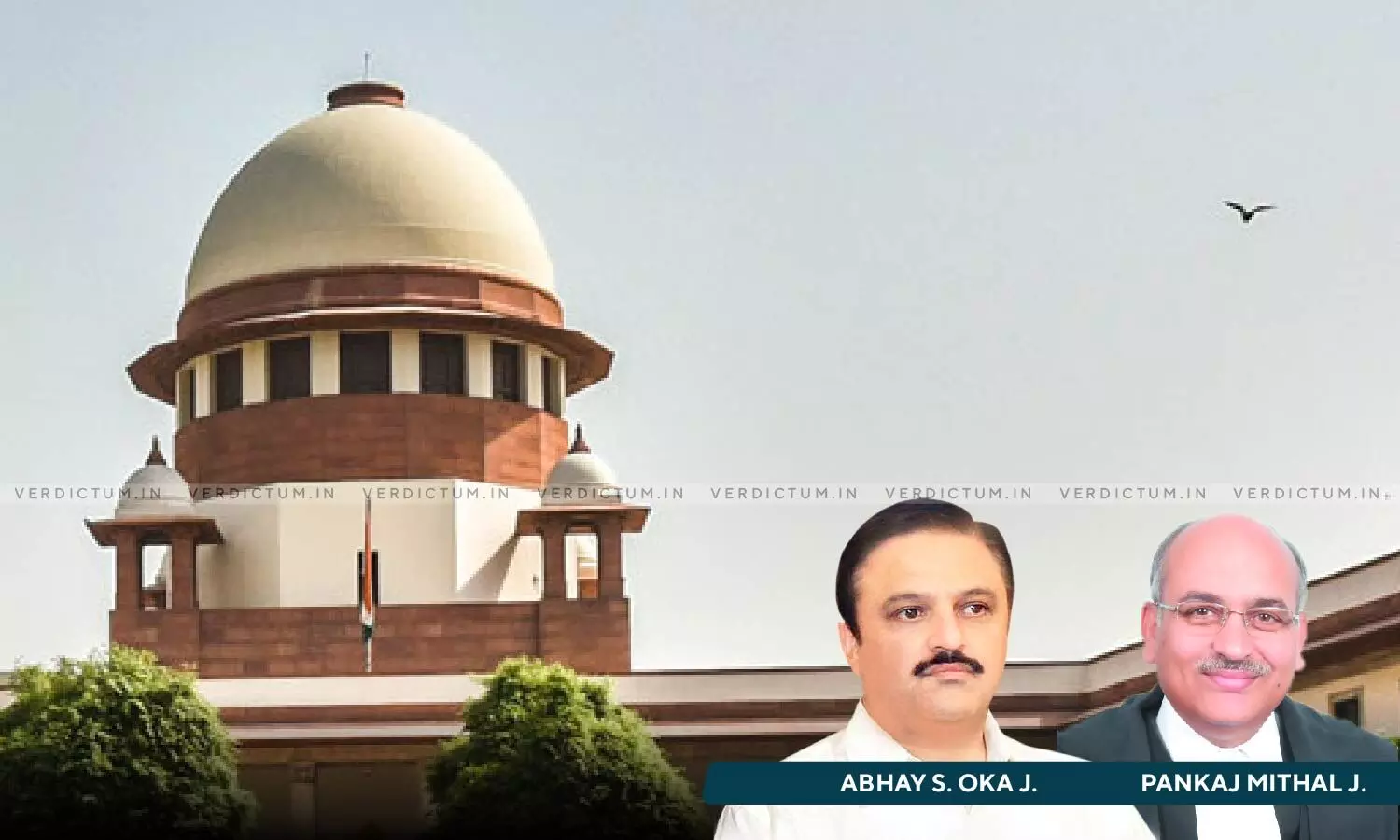
Arbitration Proceedings Cannot Be Terminated Merely Because Claimant Failed To Request Arbitral Tribunal To Fix A Date For Hearing: SC
 |
|The Supreme Court observed that the power under Section 32(2)(c) of the Arbitration and Conciliation Act, 1996 (A&C Act) can be exercised only if, for some reason, the continuation of proceedings has become unnecessary or impossible.
The Court said that the failure of the claimant to request the Arbitral Tribunal to fix a date for hearing, per se, is no ground to conclude that the proceedings have become unnecessary.
The Court observed thus in an appeal filed by a corporation in which the issue was about the legality and validity of the order of termination of the arbitral proceedings passed by the Arbitral Tribunal.
The two-Judge Bench of Justice Abhay S. Oka and Justice Pankaj Mithal held, “The power under clause (c) of sub¬section (2) of Section 32 of the Arbitration Act can be exercised only if, for some reason, the continuation of proceedings has become unnecessary or impossible. Unless the Arbitral Tribunal records its satisfaction based on the material on record that proceedings have become unnecessary or impossible, the power under clause (c) of sub-section (2) of Section 32 cannot be exercised,..The failure of the claimant to request the Arbitral Tribunal to fix a date for hearing, per se, is no ground to conclude that the proceedings have become unnecessary"
The Bench added that if the said power is exercised casually, it will defeat the very object of enacting the Arbitration Act.
Senior Advocate Nakul Divan appeared on behalf of the appellants while Senior Advocate Shekhar Naphade appeared on behalf of the respondents.
In this case, the appellant was a partnership firm (Dani Wooltex) that owned certain land in Mumbai and the respondent was a private limited company (Sheil Properties) that was engaged in real estate development. A part of the appellant’s property was permitted to be developed by the respondent under the Development Agreement in 1993. A Memorandum of Understanding (MOU) was executed by and between the appellant and the second respondent (Marico) by which the appellant agreed to sell another portion of its property. Marico submitted an objection and stated that any transaction between the appellant and Marico would be subject to the Agreement. The dispute between the appellant and Sheil led Sheil to institute a suit for the specific performance of MOU as modified by the alleged consent terms.
The appellant and Marico were parties to the said suit and Marico also filed a suit against the appellant to which Sheil was also made a party. A consensus was reached amongst the three parties and a senior member of the Bar was appointed as the Sole Arbitrator. The suit filed by Sheil was disposed of by referring the dispute in the said suit to the same Sole Arbitrator. Thus, the Arbitral Tribunal had to deal with the claims of both Sheil and Marico against the appellant. The arbitral proceeding based on Marico’s claim was heard earlier, culminating in an award in 2017 but the same based on Sheil’s claim did not proceed. After numerous meetings, the Tribunal passed an order in 2020, terminating the arbitral proceedings under Section 32(2)(c) of A&C Act. Sheil approached the High Court and the Single Judge set aside the order of termination of proceedings. Being aggrieved, the appellant approached the Apex Court.
The Supreme Court in the above context of the case noted, “It is the Arbitral Tribunal's duty to fix a meeting for hearing even if parties to the proceedings do not make such a request. It is the duty of the Arbitral Tribunal to adjudicate upon the dispute referred to it. If, on a date fixed for a meeting/hearing, the parties remain absent without any reasonable cause, the Arbitral Tribunal can always take recourse to the relevant provisions of the Arbitration Act, such as Section 25”
The Court said that the failure of the claimant to request the Arbitral Tribunal to fix a date for hearing, per se, is no ground to conclude that the proceedings have become unnecessary.
“The abandonment of the claim by a claimant can be a ground to invoke clause (c) of sub¬section (2) of Section 32. The abandonment of the claim can be either express or implied. The abandonment cannot be readily inferred. There is an implied abandonment when admitted or proved facts are so clinching that the only inference which can be drawn is of the abandonment. Only if the established conduct of a claimant is such that it leads only to one conclusion that the claimant has given up his/her claim can an inference of abandonment be drawn. Even if it is to be implied, there must be convincing circumstances on record which lead to an inevitable inference about the abandonment”, it remarked.
Accordingly, the Apex Court dismissed the appeal.
Cause Title- Dani Wooltex Corporation & Ors. v. Sheil Properties Pvt. Ltd. & Anr. (Neutral Citation: 2024 INSC 433)
Appearance:
Appellants: Senior Advocate Nakul Divan, Advocates Gaurav Agarwal, Mahesh Agarwal, Rishi Agrawala, Ankur Saigal, Gaurav Mehta, S. Lakshmi Iyer, Vikrant Shetty, Vidisha Swarup, Tansi Fotedar, Soumil Jhanwar, and AOR E. C. Agrawala.
Respondents: Senior Advocate Shekhar Naphade, AOR Vikas Mehta, Advocates Farah Hashmi, Aishwarya Dash, Prashant Pratap, Adith Nair, Vinayak Sharma, Sahil Gandhi, and Ruben Vakil.